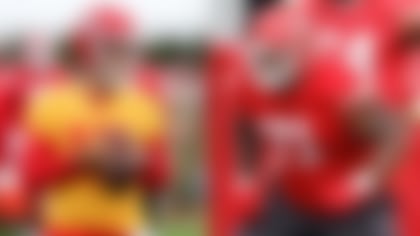My take on draft picks can be quite similar to that of NFL teams, but occasionally we have extremely divergent opinions. I like certain early-round picks more than others based upon upside or team fit, while my favorite late-round picks are often dictated by which players went later in the draft than I projected.
In this space, I'll take a look at three players from each round that I believe could make substantial immediate impacts for their new teams or have a great chance of eventually outplaying their draft slotting and turning into valuable members of the roster for the clubs that selected them.
NOTE: Click on each prospect's name for a complete scouting report.
Round 1
Kyler Murray, QB, Oklahoma
Drafted: First overall pick, Arizona Cardinals
This is one of my favorite picks, because the fit is so perfect in so many ways. Murray steps into an offense that he will already have a feel for and that allows him to play to his strengths as a passer. He also offers the ability to help his shoddy pass protection with rare scrambling and play-extending talent, which Josh Rosen didn't possess.
Jeffery Simmons, DT, Mississippi State
Drafted: 19th overall pick, Tennessee Titans
Simmons' chances of going in the first round seemed to shrink after he suffered an ACL tear in February, putting his availability for the 2019 season in doubt. However, teams did their homework on the injury, and many of them made the determination that he could be able to play at some point during the 2019 season after a stint on the PUP list. He's a lean-muscle-mass machine with an impressive combination of power and quickness to disrupt blocking schemes. Simmons has the potential to take a major leap as a pass rusher with Mike Vrabel as his head coach.
Johnathan Abram, S, Mississippi State
Drafted: 27th overall pick, Oakland Raiders
I can't stress this enough -- Abram might have the most pro-ready mindset and game of any of the draft's first-rounders. He's a clear-cut alpha dog on the field with an unyielding desire to run, hit and impose his will. He can be a little limited in coverage, but general manager Mike Mayock added a guy with a chance to be a Day 1 starter and instant tone-setter as he remakes the football character of his team.
Round 2
Jawaan Taylor, OT, Florida
Drafted: 35th overall pick, Jacksonville Jaguars
NFL team sources say a flagged knee issue may have caused Taylor to drop out of the first round, but Jaguars GM Dave Caldwell has said Taylor's medical grade was passable. So, from where I sit, Jacksonville just grabbed a top-12 talent with the 35th pick. Taylor can be a devastating run blocker, which the Jaguars need to help get running back Leonard Fournette back on track. The former Gator should also function as an upgrade in pass protection at right tackle.
Erik McCoy, C, Texas A&M
Drafted: 48th overall pick, New Orleans Saints
McCoy was one of the safer prospects in the 2019 draft, and given that the Saints had only one pick in the first three rounds, it was important for them to get this one right. McCoy showed off his athletic talent at the NFL Scouting Combine and flashed impressive strength taking on the likes of 2019 first-round picks Dexter Lawrence, Quinnen Williams and Christian Wilkins for the Aggies last season. He has the talent to step directly into the pivot following the retirement of Max Unger earlier this offseason.
Parris Campbell, WR, Ohio State
Drafted: 59th overall pick, Indianapolis Colts
After finishing my study of his tape, I realized that it was not unreasonable to put a first-round grade on Campbell, even though he was unlikely to be picked that early. He has great size, tremendous speed and offers value as a return man. The Colts can use him as both a field stretcher and a catch-and-run target near the line of scrimmage for Andrew Luck. He has the deep speed to force some safety focus away from T.Y. Hilton in that offense.
Round 3
Jalen Hurd, WR, Baylor
Drafted: 67th overall pick, San Francisco 49ers
The Patriots dabbled with a WR/RB hybrid in Cordarrelle Patterson and had mixed results last season as they figured out the best way to use him. Hurd offers the 49ers similar versatility, only he has a legitimate running back background and should be able to maneuver between running back and receiver seamlessly within a couple of years. His size, athletic ability and strength make him an intriguing matchup player who should benefit from a creative play-caller in Kyle Shanahan.
Darrell Henderson, RB, Memphis
Drafted: 70th overall pick, Los Angeles Rams
Todd Gurley's knee injury limited him down the stretch last season, and the Rams' offense suffered because of it. The team may look to limit Gurley's workload, and the addition of Henderson means that explosiveness will not be sacrificed when the RB2 is in the game. Henderson averaged 8.9 yards per carry over his last 344 rushes and had 11 touchdowns of 54-plus yards in 2018 alone. The high-flying Rams just super-charged their depth at running back.
Justin Layne, CB, Michigan State
Drafted: 83rd overall pick, Pittsburgh Steelers
The Steelers have long coveted size and length at the cornerback position, and Layne has those traits. I spoke with teams who saw the converted wideout as one of the best "upside" defenders in this draft. He needs to get stronger and tougher in run support. He also must learn to convert pass breakups into interceptions, but he's a talented press corner who was a great value late in the third round.
Round 4
Julian Love, CB, Notre Dame
Drafted: 108th overall pick, New York Giants
Evaluators I spoke with were able to pick at Love's game (primarily his long speed), but for the most part, they all acknowledged that he was a talented player. I saw Love as a solid second-round cornerback. He offers outstanding mirror-and-match footwork as well as the ability to slide inside to play the slot. I understand that he lacks long speed, but he has a long history of making plays on the football, and I don't see that changing in the pros.
Christian Miller, DE, Alabama
Drafted: 115th overall pick, Carolina Panthers
Miller's one season of production, his injury history and decision not to run a 40-yard dash for scouts all potentially played into him being available with the 13th pick of Round 4. However, he's a long-armed rusher with the ability to create winning angles around the edge or with inside counters. The Panthers took Brian Burns in the first round and basically doubled down with a similar type of rusher here who offers an insurance policy for Burns and a potential bookend rusher for down the road.
Wes Martin, OG, Indiana
Drafted: 131st overall pick, Washington Redskins
Martin was one of the last 50 prospects I wrote up of the 500 I completed for NFL.com, and he was a breath of fresh air that deep into the process. He has a burly, NFL-caliber frame with outstanding upper-body power and comes into the league ahead of the game, from a technique standpoint. He's limited athletically and fits with a power-based scheme, but I believe he could become a starter within his first two seasons.
Round 5
Ryquell Armstead, RB, Temple
Drafted: 140th overall pick, Jacksonville Jaguars
Armstead is a big, downhill running back who plays with terrific decisiveness and finds yards for himself after contact. He offers a similar type of running style to that of Leonard Fournette, so the Jaguars can keep pounding the rock, whether Fournette is taking a breather or out with yet another injury.
Mack Wilson, LB, Alabama
Drafted: 155th overall pick, Cleveland Browns
Wilson had exciting 2017 tape and was solid for much of last season, but he ended the 2018 campaign with a whimper, not a bang, then failed to impress with his postseason workouts. He has the talent and traits to end up as the steal of the fifth round, though. Wilson has the potential to become a starter for the Browns and steps into a favorable situation, given the team's need for more athleticism at the position.
Darius Slayton, WR, Auburn
Drafted: 171st overall pick, New York Giants
On paper, Slayton is a height-weight-speed prospect who could become a field-stretcher in time. I see a player with an impressive combination of speed/explosiveness and the ability to run a fully formed route tree. He's a little thin. He also lacked the production totals and consistent hands teams usually look for from Day 2 prospects, which could be why he was still available late in Round 5. I still believe his best football is ahead of him and that he's capable of becoming a WR2.
Round 6
KeeSean Johnson, WR, Fresno State
Drafted: 174th overall pick, Arizona Cardinals
I know that Arizona believes Johnson was one of the better route-runners in this draft, and I was particularly impressed with how smooth he was in his movements when I studied his tape. He's not fast for his position, and he didn't test like an explosive receiver, which is why he was available in the sixth round. However, he wins contested catches and plays with the desired combination of smoothness and suddenness. It was amazing how often Johnson's name came up when speaking with former NFL receivers about this year's draft.
Jaquan Johnson, S, Miami
Drafted: 181st overall pick, Buffalo Bills
He doesn't have great speed, and he's undersized, but Johnson is the embodiment of a ball player at the safety spot. Johnson was still waiting to hear his name called in Round 6 because teams fear he's not fast enough to range and not big enough to bang, but the tape speaks volumes, in my opinion. He's rarely out of position, has leadership qualities and is a consistent, downhill tackler. This is a great value pick.
Dexter Williams, RB, Notre Dame
Drafted: 194th overall pick, Green Bay Packers
Really shrewd pick by the Packers here. When I wrote him up, I highlighted the fact that he runs with a combination of feel, force and juice. I can envision him fitting into a rotation with Aaron Jones by the end of the 2019 season. I saw Williams as the sixth-best running back in this draft, but he was the 17th back taken. We'll see who wins the battle of League vs. Lance within a few years.
Round 7
Kris Boyd, CB, Texas
Drafted: 217th overall pick, Minnesota Vikings
For teams that focus on Boyd's cornerback tape, they will see a strong but handsy cornerback who struggled with his back to the ball in man coverage. Boyd could develop into a solid Cover 2 cornerback, but I gave him a higher grade in anticipation of a move to safety, where his coverage experience and aggressiveness in run support could push him into some early playing time in sub packages. I believe transitioning to safety gives him the best chance to outplay his draft positioning.
Jordan Brown, CB, South Dakota State
Drafted: 223rd overall pick, Cincinnati Bengals
Late bloomer who blossomed into an intriguing height-weight-speed cornerback after moving over from receiver. Brown has short arms and lacks the desired physicality and decisiveness in coverage. However, he has the traits and on-ball potential that could help push him into a role as a CB3 despite falling to the final round of the draft.
Isaac Nauta, TE, Georgia
Drafted: 224th overall, Detroit Lions
Nauta the football player and Nauta the workout guy were two totally different prospects, from my perspective, but the poor testing stuck, which is why he tumbled. His testing numbers suggest he won't be an NFL player, but I love this pick in Round 7 because he plays faster than he tested, he has great hands and I can see him competing for a role as a move tight end or H-back when Detroit looks to create matchup problems out of two-tight-end sets.
Follow Lance Zierlein on Twitter @LanceZierlein.












